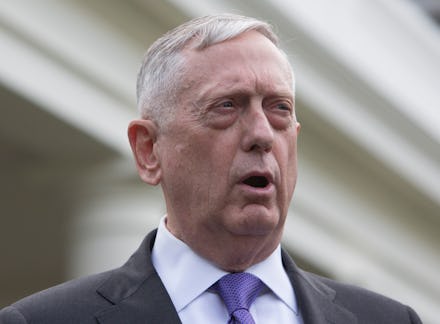In “unprecedented” move, Pentagon cuts ‘AP,’ ‘Reuters’ from James Mattis’ upcoming trip

The Pentagon has decided to dramatically reduce the number of reporters allowed to travel with United States Defense Secretary James Mattis on an upcoming overseas trip, and will not allow reporters from the Associated Press and Reuters wire services to attend. The decision has shocked and concerned the Pentagon press corps, two sources familiar with the situation told Mic.
The Pentagon’s decision, which was first reported by the Washington Examiner Wednesday, both reduces the number of reporters in total and limits the number of wire service reporters to one. Going forward, according to the two sources, who were not authorized to discuss the situation publicly, the wire services will be put on rotation instead of all attending.
According to those same sources, six reporters will be given seats on Mattis’ plane on an upcoming trip to India and the region, including a reporter with the French wire service Agence France-Presse, a reporter for the Wall Street Journal, a three-person television pool and one radio pool reporter.
The plane has room for up to 18 reporters, although normally about a dozen travel on overseas trips, the sources said.
Bureau chiefs for the AP and Reuters will discuss the issue with chief Pentagon spokesperson Dana White to get an explanation as to why reporters for those wire services will not be allowed to travel, the sources said.
White did not respond to a request for comment. Representatives for the AP and Reuters did not immediately respond to requests for comment.
The decision has shocked and concerned the Pentagon press corps, who are worried about transparency going forward, one of the sources said. The decision, according to that source, was “drastic.”
“I was not surprised to see them cut the print news organizations,” that same source said. “But I always thought that keeping the three wires was sort of sacred.”
Another source Mic spoke with called the decision “unprecedented” and “a huge break of protocol.”
The decision comes as President Donald Trump and his administration have sought to limit press access across the board and been openly antagonistic to members of the media. Mattis has, like the State Department, White House press secretaries and the president himself, scaled back the number of on-camera press conferences and briefings. And on several occasions this year, according to the two sources, the Pentagon has disinvited reporters from various news outlets from trips and has reduced the number of total reporters allowed to attend.
Secretary of State Rex Tillerson, in particular, has been particularly restrictive with the media. Tillerson, who has said he is “not a big media press access person,” has been roundly criticized for severely cutting back on access, including traveling with only one reporter — from the conservative outlet Independent Journal Review — on a March trip to Asia and holding a press conference without any U.S. news outlets in May.
One of the sources Mic spoke with said there was hope that the Pentagon would not become as hostile to the press as the State Department. Some members of the press corps were encouraged by Mattis’s habit of making himself available to the press in informal settings and coming down unannounced to the bullpen and answering questions from reporters either on or off the record, the source said. During a press availability on Aug. 31 at which reporters asked Mattis about the lack of on-camera briefings, Mattis said he preferred the informal settings.
“I don’t see you all as adversaries,” he said, according to transcript.
Mattis and a former press spokesperson, Army Col. Steve Warren, had largely avoided establishing a confrontational relationship with the Pentagon press corps. But Warren was forced out of his position in August, Foreign Policy reported, a move that dismayed and infuriated some press corps members. (One of the sources suggested the move “wouldn’t have happened if [Warren] was here.”)
“I think by and large the majority of the press corps understand that Mattis has a very difficult job to do and we try to understand that, and work around that and try to be fair,” the other source said. “But we’ve reached a point where there is now serious concern.”